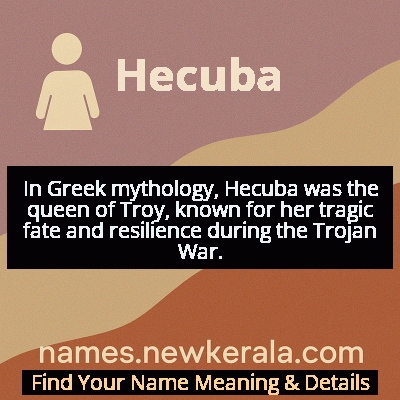Hecuba Name Meaning & Details
Origin, Popularity, Numerology Analysis & Name Meaning of Hecuba
Discover the origin, meaning, and cultural significance of the name HECUBA. Delve into its historical roots and explore the lasting impact it has had on communities and traditions.
Name
Hecuba
Gender
Female
Origin
Greek
Lucky Number
4
Meaning of the Name - Hecuba
In Greek mythology, Hecuba was the queen of Troy, known for her tragic fate and resilience during the Trojan War.
Hecuba - Complete Numerology Analysis
Your Numerology Number
Based on Pythagorean Numerology System
Ruling Planet
Uranus (Rahu)
Positive Nature
Strong sense of order, loyal, practical, and disciplined.
Negative Traits
Stubborn, overly serious, rigid, and prone to feeling restricted.
Lucky Colours
Blue, gray.
Lucky Days
Saturday.
Lucky Stones
Blue sapphire.
Harmony Numbers
1, 7, 8.
Best Suited Professions
Managers, engineers, accountants, organizers.
What People Like About You
Dependability, discipline, practicality.
Famous People Named Hecuba
Hecuba (Mythological)
Queen of Troy
Central figure in Trojan War narratives, mother of 19 children including Hector and Paris
Hecuba (Literary Character)
Tragic Figure
Protagonist in Euripides' plays 'Hecuba' and 'The Trojan Women', symbolizing the suffering of war
Hecuba (Astronomical)
Asteroid Namesake
Asteroid 108 Hecuba discovered in 1869, named after the mythological queen
Name Variations & International Equivalents
Click on blue names to explore their detailed meanings. Gray names with will be available soon.
Cultural & Historical Significance
Throughout history, Hecuba has been reinterpreted in various artistic mediums, from Renaissance paintings to modern theatrical productions. Her character represents the voice of women in wartime, the strength of maternal bonds, and the psychological trauma of loss. In psychoanalytic theory, Hecuba has been studied as an archetype of the grieving mother, while feminist scholarship has reclaimed her as a symbol of female agency in the face of overwhelming adversity. Her enduring presence in cultural discourse demonstrates how ancient mythological figures continue to resonate with contemporary human experiences.
Extended Personality Analysis
Individuals named Hecuba are often perceived as possessing profound emotional depth, resilience, and protective instincts rooted in the mythological queen's narrative. They typically exhibit strong maternal qualities, fierce loyalty to family, and an ability to endure tremendous hardship with dignity. Like their namesake, Hecubas are often seen as strategic thinkers who can navigate complex emotional landscapes, though they may struggle with tendencies toward vengeance when wronged. Their personality combines regal bearing with deep emotional vulnerability, creating a compelling contrast between outward strength and inner turmoil.
In modern psychological terms, the name Hecuba suggests someone with high emotional intelligence, particularly in understanding grief and loss. These individuals often demonstrate remarkable perseverance through adversity and possess a philosophical depth that comes from contemplating life's tragedies. They may be drawn to helping others through difficult times or careers in counseling, social work, or the arts. However, the weight of the name can sometimes manifest as melancholy or a tendency to shoulder others' burdens too heavily. The mythological association also implies a capacity for transformation—the ability to reinvent oneself after profound loss or trauma.
Modern Usage & Popularity
In contemporary times, Hecuba remains an exceptionally rare given name, primarily used in academic, literary, or artistic circles where parents seek names with classical weight and mythological significance. The name has never ranked in the top 1000 names in English-speaking countries, maintaining its status as a distinctive choice for those wanting to honor Greek heritage or dramatic literature. Recent years have seen a slight increase in usage among parents interested in powerful female names from mythology, paralleling the rising popularity of names like Persephone and Athena. However, Hecuba's strong association with tragedy and suffering makes it a bold choice that requires careful consideration of the emotional weight it carries. The name appears occasionally in modern fiction and fantasy literature, where authors use its mythological resonance to establish character depth and classical connections.
Symbolic & Spiritual Meanings
Hecuba symbolizes the transformative power of grief, maternal devotion, and the complex relationship between vengeance and justice. Metaphorically, she represents the human capacity to endure unimaginable loss while maintaining dignity and agency. Her story serves as an archetype for how personal tragedy can reshape identity, turning a queen into a slave, a mother into an avenger, and ultimately a human into a legendary figure. The name carries connotations of resilience born from suffering, the political dimensions of maternal love, and the blurred lines between victimhood and empowerment.
In broader symbolic terms, Hecuba embodies the voice of the marginalized in conflict—particularly women and mothers whose stories are often overshadowed by male heroes in wartime narratives. She represents the psychological cost of war on non-combatants and the enduring strength of the human spirit in the face of collective trauma. The metamorphosis myth associated with her—where she transforms into a dog—adds layers of symbolism related to fidelity, wildness, and the boundary between human and animal nature. This transformation can be interpreted as both a curse and liberation, reflecting the complex ways trauma can simultaneously destroy and redefine personal identity.

